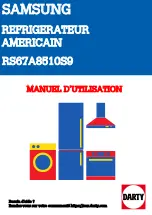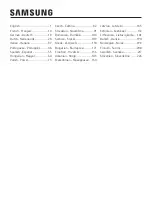
2
COMMENT VOUS DÉBARRASSER
CONVENABLEMENT DE VOTRE ANCIEN RÉFRIGÉRATEUR
Les enfants pris au piège ou morts d’asphyxie
sont toujours d’actualité. Les réfrigérateurs
abandonnés sont toujours aussi dangereux,
même si on n’attend que «quelques jours»
pour s’en débarrasser. Si vous ne gardez pas
votre ancien réfrigérateur, veuillez suivre les directives
ci-dessous afin de prévenir les accidents.
Avant de vous débarrasser de votre ancien
réfrigérateur ou congélateur :
Démontez les portes.
Laissez les clayettes en place afin d’empêcher
les enfants de grimper à l’intérieur.
Réfrigérants
Tous les appareils de réfrigération contiennent des
réfrigérants qui, conformément aux lois fédérales,
doivent être enlevés avant toute élimination de
l’appareil. Si vous vous débarrassez de vieux
appareils de réfrigération, vérifiez, auprès de la
société qui s’occupe de
leur élimination, ce que vous devez faire.
DANGER! RISQUES POUR LES ENFANTS
PROPER DISPOSAL OF THE REFRIGERATOR
Child entrapment and suffocation are not
problems of the past. Junked or abandoned
refrigerators are still dangerous…even if they
will sit for “just a few days.” If you are getting
rid of your old refrigerator, please follow the
instructions below to help prevent accidents.
Before You Throw Away Your Old
Refrigerator or Freezer:
Take off the doors.
Leave the shelves in place so that children
may not easily climb inside.
If the refrigerator has a lock make it unusable
Refrigerants
All refrigeration products contain refrigerants,
which under federal law must be removed prior to
product disposal. If you are getting rid of an old
refrigeration product, check with the company
handling the disposal about what
to do.
DANGER! RISK OF CHILD ENTRAPMENT
CORDONS PROLONGATEURS
Nous vous recommandons fortement de ne pas utiliser de cordons prolongateurs à cause des risques
potentiels qu’ils présentent dans certaines conditions.
Toutefois si vous décidez d’utiliser tout de même un cordon prolongateur, il est absolument nécessaire
qu’il s’agisse d’un cordon à 3 fils avec mise à la terre pour appareils électro ménagers homologué UL (aux États-
Unis) ou certifié CSA (au Canada), pourvu d’une fiche et d’une prise mises à la terre de 15 ampères (minimum) et
de 120 volts.
USE OF EXTENSION CORDS
Because of potential safety hazards under certain conditions, we strongly recommend
against the use of an extension cord.
However, if you must use an extension cord, it is absolutely necessary that it be a UL-listed (in the United States)
or a CSA certified (in Canada), 3-wire grounding type appliance extension cord having a grounding type plug
and outlet and that the electrical rating of the cord be 15 amperes (minimum) and 120 volts.
IMPORTANT SAFETY INFORMATION.
READ ALL INSTRUCTIONS BEFORE USING.



































